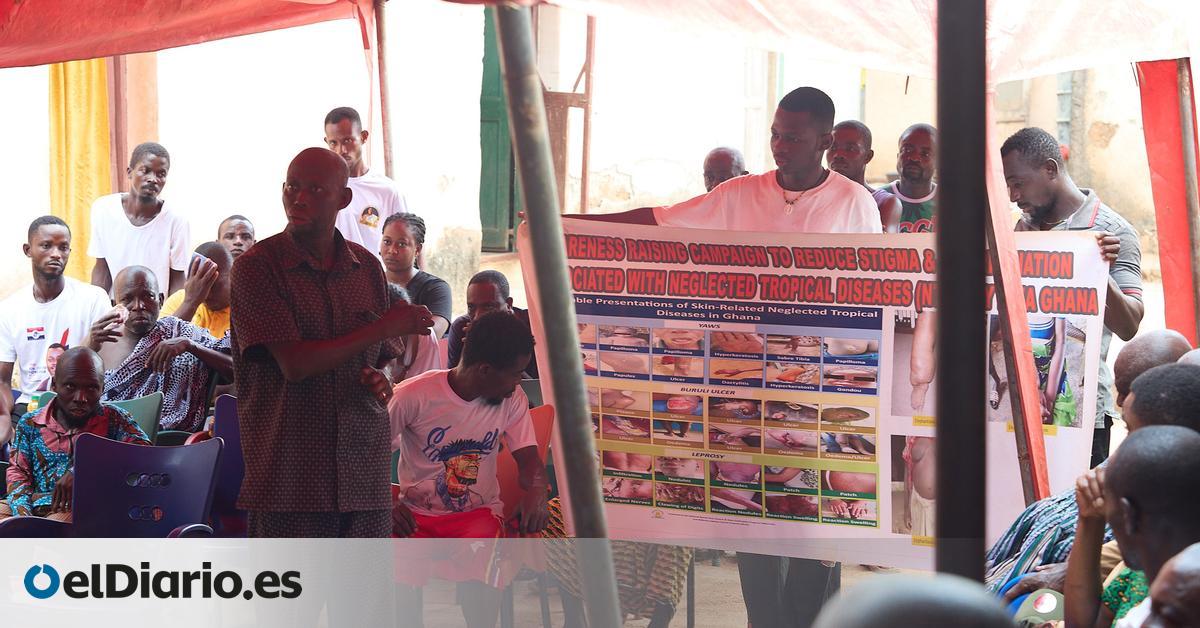Since 2013, the World Health Organization (WHO) has promoted actions that focus on the control, elimination and eradication of up to twenty Neglected Tropical Diseases. Despite the efforts of governments and associations to contribute to this goal, more than 1 billion people continue to suffer from them in the world, with a special impact in the most impoverished and forgotten places on the planet.
Conditions such as leprosy, lymphatic filariasis and Buruli ulcer cause physical disabilities associated with visible aspects, such as clawed hands, foot drop and nerve damage (in the case of leprosy) or abnormal swelling in body parts (lymphatic filariasis). —, in addition to aggressive skin ulcers. But that part of the disease is only the visible part. In most cases, there is also poor mental well-being, particularly depression and anxiety, often as a result of the rejection, stigma and discrimination they face.
In Nigeria, Africa’s most populous country, an estimated 168 million people—nearly 80% of the population—are at risk of contracting at least one NTD. Many of these diseases have a direct relationship with social exclusion and discrimination associated with stigma, with a strong link when there are visible signs of the disease, especially as it affects women, who are also twice as likely to experience mental health problems.
It is estimated that the 20% of people with lymphatic filariasis suffer from mental health problems in Nigeria. But the number may be much higher, because people with NTDs often live in poverty and in rural areas, and are unlikely to be able to access the mental health care they need. “We know that a very high proportion of people with diseases such as leprosy experience conditions such as depression and anxiety,” comments the director of mental health at CBM Global, Julián Eaton, one of the authors of the Mental Health and NTD Manual of the WHO on the importance of projects to address these diseases also addressing mental health.
Carrying out effective and complete treatment in NTD should not be limited only to the health aspect and control of the disease; specific actions must be considered that also address the social determinants of health, as well as the resulting mental problems. This will help reduce suffering and address the stigma faced by communities suffering from these types of diseases.
A project to break stigma and improve mental health
IDEA Nigeria and CBM Global Disability Inclusion have coordinated in a consortium initiative with the NTD and mental health programs of the Nigerian government, the University of Jos and other civil society organizations such as IDEA Nigeria in the development and pilot testing of a comprehensive intervention for the integration of mental health and NTDs. This intervention constitutes a pilot for an integrated method that addresses NTDs and mental health.
Thus, recommendations will be drawn from its results that help guide the action of the Ministry of Health. This system aims to improve governance, technical advice and coordination by the Ministry of Health for the inclusive implementation of the mental health components of the Nigerian Master Plan, while developing an intervention model to improve access to healthcare integrated mental and social and livelihood support for people living with NTDs in Nigeria. In addition, there is the benefit of obtaining evidence for learning, which will serve to expand integrated mental health care, linking civil society and government services in a framework that guarantees a sustainable model change and the use of components of the health system, such as personnel, drug supply and information system.
A direct impact on the community
Mental health conditions and NTDs share many common risk factors, such as poverty, being part of excluded groups, and poor access to medical care and education, hence a need to establish common platforms for better care. equitable to these cases. Peter Lorkighir is the Director of IDEA Nigeria, one of the participating organizations: “Many people say negative things because they do not understand these diseases,” he comments on the stigma that affects NTD sufferers. “In most cases, family members were more stigmatized than outsiders. Affected people can also help a lot by telling their life stories so that they understand more about NTDs.”
A group of global and national Associations and NGOs, NNN (NTD NGO Network) of which the Anesvad Foundation is a part, works to develop an evidence base for interventions in mental health and stigma. Through the mental wellbeing and stigma group, we advocate for a more comprehensive approach to NTD programming and research, achieving person-centred care for national programs to use in future developments.
Additionally, this project works with groups of people who raise awareness and disseminate information about NTDs in communities, to achieve greater knowledge of the disease, but also to stop the stigma that surrounds people affected by NTDs and improve their health. mental and social development. “The job of peer support groups is to address internal challenges to advise and encourage each other,” explains Lorkighir. “It’s about helping the public understand that they were like them before, but it happened to them and when they are treated they will heal. “Those words usually change people’s mindset from negative to positive.”
This important community work saves lives, since the deterioration of their mental health can lead to suicide. Also, it contributes to the construction of the nation and the development of the community, and, in the words of Peter Lorkighir, “it brings happiness,” due to the mental change that occurs not only in the affected person, but also in their family and neighborhood. by breaking the stigma that isolates and harms the entire environment of the affected person. Reducing this discrimination to the lowest level in the places where this project is implemented, not only has an individual impact, but also a community one: the economic well-being and social integration of the affected people can improve and, with this, they can recover a dignified life.

